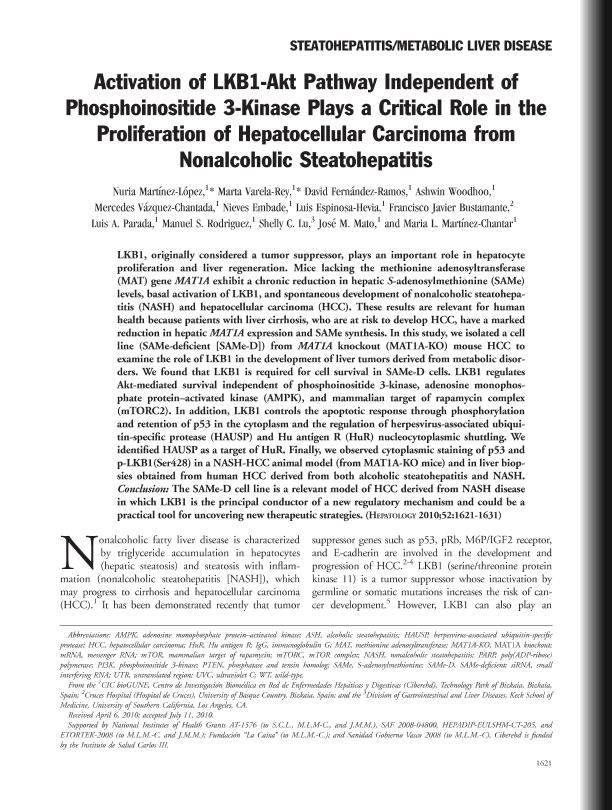Artículo
Activation of LKB1-Akt pathway independent of phosphoinositide 3-kinase plays a critical role in the proliferation of hepatocellular carcinoma from nonalcoholic steatohepatitis
Martínez López, Nuria; Varela Rey, Marta; Fernández Ramos, David; Woodhoo, Ashwin; Vázquez Chantada, Mercedes; Embade, Nieves; Espinosa Hevia, Luis; Bustamante, Francisco Javier; Parada, Luis Antonio ; Rodriguez, Manuel S.; Lu, Shelly C.; Mato, José M.; Martínez Chantar, María L.
; Rodriguez, Manuel S.; Lu, Shelly C.; Mato, José M.; Martínez Chantar, María L.
 ; Rodriguez, Manuel S.; Lu, Shelly C.; Mato, José M.; Martínez Chantar, María L.
; Rodriguez, Manuel S.; Lu, Shelly C.; Mato, José M.; Martínez Chantar, María L.
Fecha de publicación:
29/10/2010
Editorial:
John Wiley & Sons Inc
Revista:
Hepatology (baltimore, Md.)
ISSN:
0270-9139
Idioma:
Inglés
Tipo de recurso:
Artículo publicado
Clasificación temática:
Resumen
LKB1, originally considered a tumor suppressor, plays an important role in hepatocyte proliferation and liver regeneration. Mice lacking the methionine adenosyltransferase (MAT) gene MAT1A exhibit a chronic reduction in hepatic S-adenosylmethionine (SAMe) levels, basal activation of LKB1, and spontaneous development of nonalcoholic steatohepatitis (NASH) and hepatocellular carcinoma (HCC). These results are relevant for human health because patients with liver cirrhosis, who are at risk to develop HCC, have a marked reduction in hepatic MAT1A expression and SAMe synthesis. In this study, we isolated a cell line (SAMe-deficient [SAMe-D]) from MAT1A knockout (MAT1A-KO) mouse HCC to examine the role of LKB1 in the development of liver tumors derived from metabolic disorders. We found that LKB1 is required for cell survival in SAMe-D cells. LKB1 regulates Akt-mediated survival independent of phosphoinositide 3-kinase, adenosine monophosphate protein-activated kinase (AMPK), and mammalian target of rapamycin complex (mTORC2). In addition, LKB1 controls the apoptotic response through phosphorylation and retention of p53 in the cytoplasm and the regulation of herpesvirus-associated ubiquitin-specific protease (HAUSP) and Hu antigen R (HuR) nucleocytoplasmic shuttling. We identified HAUSP as a target of HuR. Finally, we observed cytoplasmic staining of p53 and p-LKB1(Ser428) in a NASH-HCC animal model (from MAT1A-KO mice) and in liver biopsies obtained from human HCC derived from both alcoholic steatohepatitis and NASH.
CONCLUSION:
The SAMe-D cell line is a relevant model of HCC derived from NASH disease in which LKB1 is the principal conductor of a new regulatory mechanism and could be a practical tool for uncovering new therapeutic strategies.
Palabras clave:
Lkb1-Akt
,
Hepatocellular Carcinonma
,
Steatohepatitis
Archivos asociados
Licencia
Identificadores
Colecciones
Articulos(IPE)
Articulos de INST.DE PATOLOGIA EXPERIMENTAL
Articulos de INST.DE PATOLOGIA EXPERIMENTAL
Citación
Martínez López, Nuria; Varela Rey, Marta; Fernández Ramos, David; Woodhoo, Ashwin; Vázquez Chantada, Mercedes; et al.; Activation of LKB1-Akt pathway independent of phosphoinositide 3-kinase plays a critical role in the proliferation of hepatocellular carcinoma from nonalcoholic steatohepatitis; John Wiley & Sons Inc; Hepatology (baltimore, Md.); 52; 5; 29-10-2010; 1621-1631
Compartir
Altmétricas



